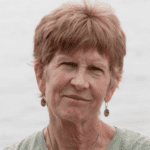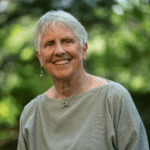We breathe, we are alive, and because we love, we feel the pain of losing. Nearly all of us grieve. It is as poet Albert Huffstickler writes:
We think we get over things.
We don’t get over things.
Or say, we get over the measles,
but not a broken heart.
We grieve the loss of a soul mate, the person or people we have held tight. We grieve for neighbors and colleagues, for people behind the numbers and charts in the news, for strangers whose stories we know, even if we have never met. We grieve places that we love that are disappearing or being harmed beyond recognition.
There’s even a newish word that speaks of this disorienting experience. The word is solastalgia. “As opposed to nostalgia—the melancholia or homesickness experienced by individuals when separated from a loved home—solastalgia is the distress that is produced by (negative) environmental change impacting on people while they are directly connected to their home environment.” It’s the feelings of dis-ease you experience when your home, your culture, your way of life, and your very identity are in harm’s way. Indigenous people in the Arctic who are losing their sea ice, islanders confronted by rising seas, farmers whose lands are desiccated or flooded already lament these conditions.
May I welcome the life that is mine, and mine alone.
We grieve for losses that we haven’t yet experienced, but fear will come. We worry that climate disruption is already baked into our weather patterns, that losses of ecosystems and biodiversity, degradation of lands and oceans, are inexorably bearing down on us, threatening the most vulnerable communities first. We hear the early warnings from scientists telling us that humans are creating conditions for new and more-dangerous pandemics.
There is no end run around, or end point, to grieving. And yet, perhaps you can begin to imagine a moment when grief lifts just enough so that you sense something changing. You see that some old habits and behaviors don’t sustain you anymore and will not support the well-being of our children and future generations. In this clear awareness, you recognize that now you have the chance to make different, more life-affirming choices. You don’t have to succumb to despair.
You catch a glimmer of something fresh. Perhaps, it’s a feeling akin to hope, a more sanguine or buoyant energy than you have known in a long while. Or maybe, it’s a whiff of persistence, of your own grit and resilience. You can keep going. You do have resources and inner strength. You can cultivate an unshakeable core.
Even though you would not have chosen all of the life you have, you feel some sense of purpose. You feel more balanced, more at home, stronger, and more accepting of what has happened and the way your life is unfolding.
How is this possible? When everything is uncertain, when you still suffer from unspeakable losses, how can there be light? And yet, for many people, there is! Some speak of grace or mercy. Others, who don’t believe in a higher power, find solace in the human capacity to suffer and cry, but also to laugh, and even in the most tragic situations, to glimpse joy.
What if we got in touch with our vastness, our capacity like a lake or the sky to hold whatever arises? What if we allowed everything that has happened, accepted all the experiences we’ve had, those that we like, those we don’t choose? What if we were to pause and allow grief to wash over us and change us (as it inevitably does), and let ourselves open—and be fully here—in the only life that’s ours to live?
As weeks and months go by following a tragedy or major loss, imagine that you keep looking inward, trying to make sense of what has happened, trying to see the shape of your experience and how it changes and creates new meaning in your life. Imagine offering yourself great kindness and compassion. Imagine reaching out to other people and feeling fragile new connections.
What have you learned from your suffering?
Instead of hoping for specific future outcomes that may or may not occur, you focus on what researcher and author Kaethe Weingarten calls “reasonable hope,” anchored right here in the present moment.
You accept that you cannot know the road ahead. Awkwardly, you try something, fail, and brush yourself off. You adopt the old adage about faking it until you make it. You open to the possibility of serendipity. Slowly, with uncertainty, you begin to welcome it all and cultivate what’s yours and yours alone, to grow.
Maybe you discover new passions and interests. You decide to sign up for a yoga class or cooking class, even if it is only offered online. Or, if it’s possible, you accept an invitation for dinner with new friends, or you spend wonderful afternoons with a grandchild, rekindle old relationships, or sign up for your summer camp reunion. You go for a walk by the ocean and feel at peace. You act generously, find moments to be of service, and discover that you feel happier and more connected.
Before, when grief was recent, the walls of your home, the ceilings, furniture, floors, everything seemed dull and colorless. But now, imagine that the rooms seem brighter and welcoming. In a corner, one soft gray chair remains for you to visit whenever you feel blue.
You realize that you don’t have to leave behind the one(s) you love, miss, and grieve. You do go on. You make new relationships and forge new memories. Maybe you even love again. Dusting off your precious photographs, you feel confident that you can always invite the people and beings most important to you to come along, too. Grief is a little more translucent somehow, no longer crowding the foreground of your mind and heart. What have you learned from your suffering and pain? What do you have to share? How will you spend your precious life, this moment, these twenty-four hours?
Meditation
Sit quietly for a few moments, noticing the feeling and flow of your breath, in and out. Say slowly, to yourself, the following phrases:
May I find the courage to bear my sorrow.
May I hold reasonable hope.
May I welcome the life that is mine, and mine alone.
Excerpted from Opening to Grief: Finding Your Way from Loss to Peace, by Claire B. Willis and Marnie Crawford Samuelson (Dharma Spring, 2020). Reprinted by permission of Red Wheel/Weiser. All rights reserved.


